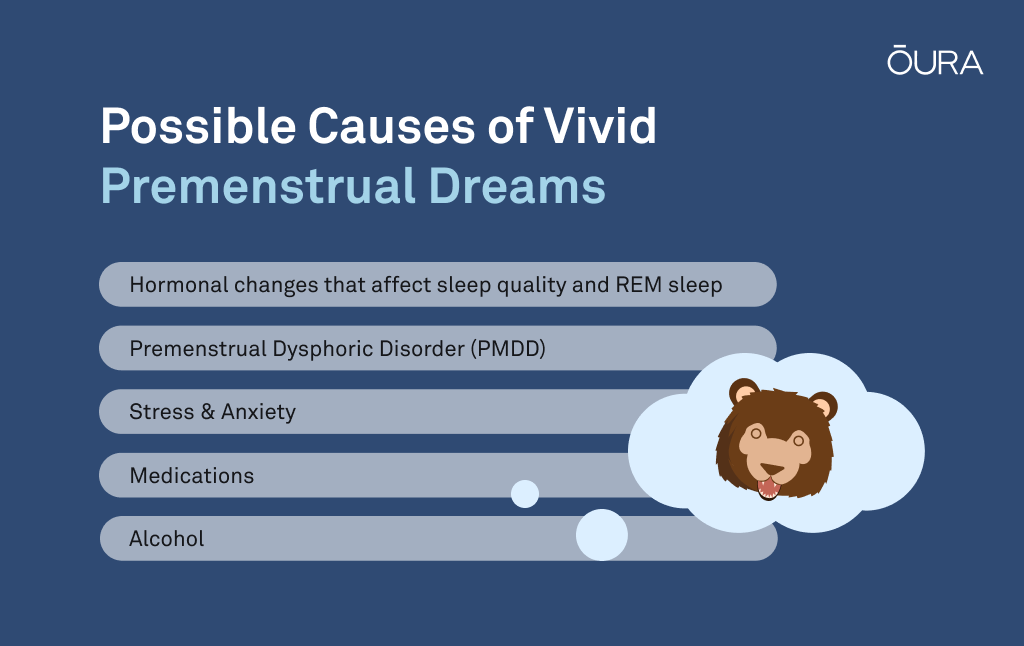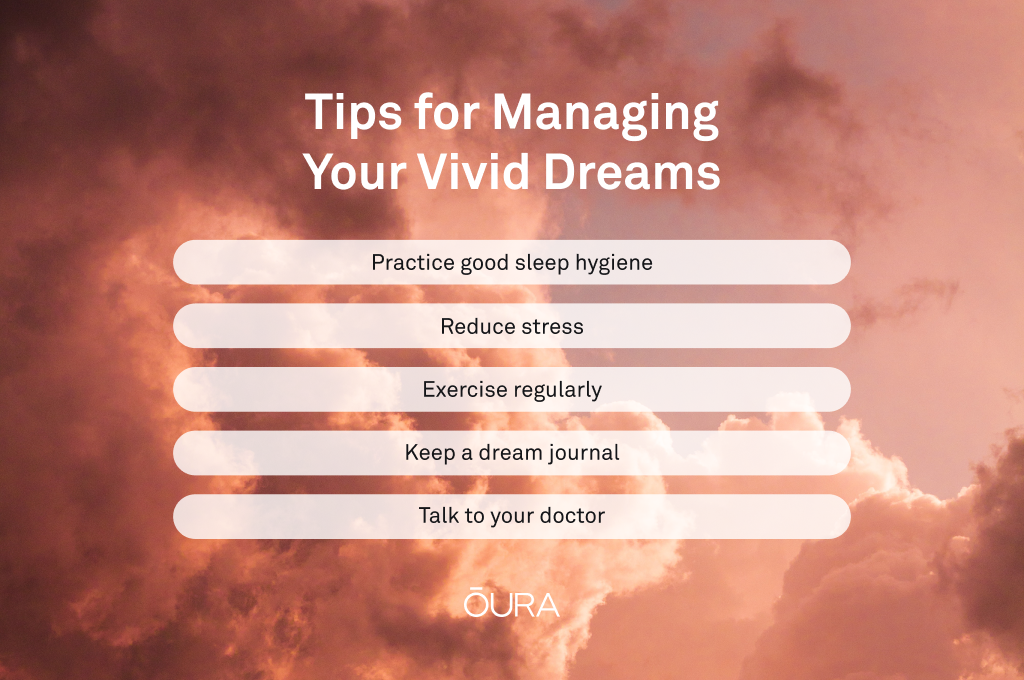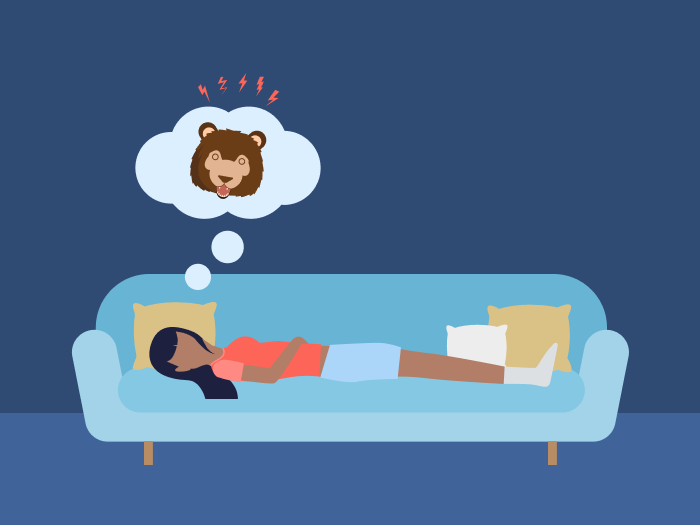I was running, but I didn’t know what from. All I knew was that it was closing in on me, and my legs were as heavy as lead. As it grabbed my shoulders, I gasped… and woke up.
I checked my Oura’s Cycle Insights feature, and sure enough — it showed that my period was due. The period prediction graph showed a steadily climbing line, indicating that my body temperature was increasing as I moved toward the end of my monthly cycle.
Weird dreams before period? You’re not alone. Many women and people who menstruate report experiencing vivid dreams before a period — dreams that range from action-packed adventures to full-blown nightmares in the days leading up to their monthly cycles.
The good news: Having vivid dreams before your period is perfectly normal and nothing to worry about.
However, if vivid dreams are negatively impacting your sleep quality, we’ll suggest some tips that might help you minimize them. But first, let’s dive into the science linking vivid dreams and the menstrual cycle.
RELATED: How Your Menstrual Cycle Impacts Your Entire Body
What’s the Connection Between Vivid Dreams and Menstruation?
A large body of research shows a connection between the premenstrual — or luteal — phase and increased sleep disorders, such as insomnia. While the connection is not totally clear, experts believe vivid dreams may be one of the side effects of hormonal fluctuations.
After ovulation, levels of the hormone estrogen drop while progesterone rises, preparing your body for menstruation. These hormonal changes can affect your sleep — a 2014 study found that rising progesterone levels were strongly associated with sleep fragmentation and disturbances.
So what does this have to do with your dreams? Well, experts believe that interrupted sleep cycles shorten the amount of time you spend in rapid eye movement (REM) sleep. REM is the phase when dreaming occurs, so if you wake up during this phase, you’re more likely to remember your dreams. One theory even suggests a direct link between higher progesterone levels and shorter REM sleep cycles.
READ MORE: What Are the 4 Stages of Sleep?
Additionally, rising progesterone levels raise your body temperature. Since your body likes to be cool at night, a higher temperature can also lead to disturbed sleep and shorter REM cycles and make you more prone to waking up during REM — making it easier to remember your vivid dreams.
Vivid dreams come in many forms and may simply be a reflection of your current life circumstances — for instance, if you have a big presentation coming up at work, you might have a vivid dream about looking down during the presentation and realizing you’re completely naked. Or if you’re feeling stressed out, you might have a classic stress dream like your teeth falling out.
Alternatively, your vivid dreams might be more positive — like dreaming about flying or achieving a significant life goal. Whatever you dream about before your period starts, don’t read too much into it — it’s most likely just down to your fluctuating hormones.
If you do want to analyze your dreams, try keeping a dream journal near your bed and noting down your vivid dreams. You may notice patterns that provide clues to what’s going on in your subconscious mind.
But what happens during the rest of your cycle? Chances are you probably dream just as frequently, but if you don’t wake up during the REM stage of sleep, you’re less likely to remember your dreams in the morning. This creates the impression of dreaming more during the luteal phase, although that’s unlikely to be the case.
RELATED: Sweet Dreams: How Dreaming Can Help Lower Stress and Regulate Emotions
Other Causes of Vivid Dreams Before Period
There may be other contributing factors that, together with your hormonal changes, can cause strange dreams.

Premenstrual Dysphoric Disorder (PMDD)
PMDD is an extreme form of the PMS (premenstrual syndrome) that most people who menstruate experience. Symptoms of PMDD include extreme mood swings, sadness, anger, irritability, and suicidal thoughts.
Since PMDD is caused by the same hormonal changes that cause PMS, PMDD sufferers may also experience vivid or bad dreams during the luteal phase.
Stress and Anxiety
Let’s be real — who doesn’t feel at least a little stressed and anxious these days? Whether you’re worried about work, finances, your health, or someone in your family, there are plenty of daily stressors that can manifest at night as weird dreams. Add to this the sleep disturbances brought on by hormonal fluctuations, and you have the recipe for some crazy dreams.
READ MORE: How Stress Affects Your Sleep
Medications
Some medications — such as antidepressants or blood pressure medicine — can cause vivid dreams. The combined effect of these drugs with higher amounts of progesterone may make these intense dreams even more dramatic.
Alcohol Consumption
Alcohol can affect your sleep in a number of ways, including making dreams more wild or vivid. Again, this effect may be compounded by hormonal fluctuations.
If you’re an Oura member, you can measure the impact of alcohol on your sleep quality using the Tags feature.
Tips for Managing Vivid Dreams Before Period
Vivid dreams aren’t necessarily a bad thing — sometimes, they can be fun or help you solve a problem you’ve been grappling with. However, the sleep disturbances they cause may lead to daytime sleepiness, which can impact your concentration and productivity or affect your mood.
But if you suspect the vivid dreams during ovulation or before your period are affecting your sleep quality, here are a few tips that may help minimize their impact.

READ MORE: Tired During Your Period? 5 Potential Reasons Why
Practice Good Sleep Hygiene
Sleep hygiene refers to both your pre-sleep habits and behaviors and your sleeping environment. If vivid dreams are disturbing your sleep, try some of the following:
- Limit caffeine and alcohol before bed, as they can exacerbate vivid dreams.
- Make sure your bedroom is cool enough to accommodate your increasing body temperature.
- Avoid the blue light from screens at least one to two hours before bedtime to improve sleep quality.
- Aim to go to sleep and wake up at the same time every day to regulate your circadian rhythm.
READ MORE: 5 Ways to Upgrade Your Sleep Hygiene
Reduce Stress
A 2010 study found that women who feel stressed early in their menstrual cycle are more likely to have severe PMS symptoms. Therefore, stress management techniques, such as yoga, meditation, and mindful breathing, may help alleviate stress and reduce the severity of vivid dreams.
Exercise Regularly
Exercise is a great way to reduce stress and improve sleep quality. Not only that, but research shows that it may help alleviate the premenstrual symptoms that can contribute to vivid dreams. In the study, women who exercised for 60 minutes a day three times a week reported improvements in their physical and mental health.
Keep a Dream Journal
If your dreams are disturbing or you feel they may hold a hidden meaning or message, try journaling about any recurring themes or patterns. This can help you better understand the root cause of your vivid dreams and work on resolving any underlying issues.
Talk to Your Doctor
If your vivid dreams are causing significant distress or interfering with your daily life, talk to your doctor. They may be able to recommend treatments or medications to help manage your symptoms.
The Bottom Line: Vivid Dreams Before Period Meaning
Having vivid dreams before your period is perfectly normal and something many women experience. However, they can reduce the amount of REM sleep you get and impact your sleep quality in other ways. If premenstrual dreams are affecting your sleep, try some of the tips outlined above to bring it back into balance.
The Oura Ring and App can also provide you with personalized insights into sleep quality and your menstrual cycle. By tracking this data across multiple months, you can make lifestyle tweaks that support healthy sleep at every stage of your cycle.
READ MORE: How Oura Data Can Help You Understand Your Menstrual Cycle











